Environment - The villages of Kery and Backombel elevated to the status of Ecovillages
The development and town-planning Commission of the National Assembly visited the achievements of the Ecovillage Project in the villages of Kery and Backombel (Thies) on October 17, 2015
The Ecovillage Project of Japan International Cooperation Agency (JICA), in cooperation with the National Agency of Ecovillages (ANEV) presented to a dozen parliamentarians of the development and town planning Commission, the achievements made in the villages of Kery and backombel and the fields of MBIR Ndao. This site visit which was organized in two stages has enabled parliamentarians to evaluate the efforts of ANEV and JICA to strengthen rural development by ensuring the harmonization of the ecology and economy by promoting Ecovillages.
First stage of the tour: Discovering the bio-digester set up in Kery!
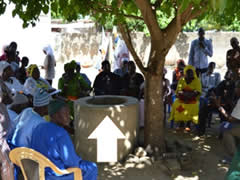
Parliamentarians, members of ANEV and the Ecovillages Project around the bio-digester (shaped like a well) for a session of explanation on its operating system
The bio-digester is a facility in which biogas is produced from the decomposition of organic matter such as cow or pig dung. Regarding the 10m3 bio-digester installed at Ms. Marième Diop's house, in the village of Kery, she feeds it from cow dung collected from breeders to produce biogas required for her daily energetic needs in cooking meals and the supply of the electric bulb used in the kitchen. " This facility is very useful, it allowed us a more streamlined and faster work in the kitchen, I can cook with throughout the year, " said Ms. Diop, beneficiary of the bio-digester through the Ecovillages Project.
ANEV and JICA have planned to install 10,000 bio-digesters across the Senegalese territory; the primary goal is to enable rural households to have an energy autonomy and secondly to fight against deforestation. Indeed, with the use of the only cow dung to produce biogas, households are no longer forced to cut wood in the forest, even better, residues of cow dung which are used to supply the bio-digester serve as fertilizers!
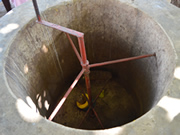
The bio-digester of 10m3, generally used by households. The crank is used to mix the cow dung which will be poured in the bio-digester
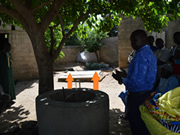
Cow dung once kneaded into the digester, ferments and produces biogas which is fed into an underground pipe and will come out into the kitchen at the installed gas stoves. The residue of cow dung is led into the pit dug for this purpose (arrow)
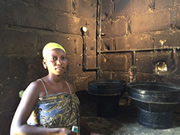
Mrs Marième Diop, recipient of a bio-digester at home, no longer faces the drawbacks of cooking over a wood fire thanks to the bio-digester
Households benefitting from the bio-digester installation through the Ecovillage Project saw their expenditures for the purchase of kitchen wood, between 10 000 and 15 000 FCFA, decrease considerably. Indeed, the cost of installing the bio-digester through the Project is 315 000 FCFA, funded up to 80% by ANEV. The remaining 20% are payable by households through the "revolving fund" set up by JICA to allow beneficiaries pay the balance at a rate of 9000 to 10 000 FCFA per month.
Second stage of the visit: solar power plants installed in the fields of MBIR Ndao (Thies)
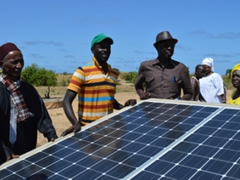
Abdoulaye Gueye (wearing the green hat), landowner in the fields of Keur MBIR Ndao is surrounded by parlementarians who came to visit the solar panel installations he received through the Ecovillage Project
In the fields of Keur MBIR Ndao (Thies), several farmers have benefited from the installation of solar niches that provide the necessary electricity to operate the pump for the field's water supply. Abdoulaye Gueye, a resident of this village is among the beneficiaries of 3 solar panels and a pump installed in their fields through the Ecovillage Project initiated by JICA and ANEV since June 2013. It has to be said that vegetable gardening is popular in this part of the region (Thies). These solar panels are a great opportunity for farmers as they allow them to save the expenses incurred for the purchase of fuel " Before I have these solar panels, I spent between 300,000 and 350,000 CFA francs in six months to buy fuel; I can now stay 1 year to 1.5 years without buying fuel, these solar installations are really helpful "says Gueye who is also happy to have been able to expand his fields. Indeed, each of the 3 solar panels have the ability to produce 195watt, which gives him in total about 600Watt of electricity power, that is enough to expand his exploited land (from a quarter hectare to 1 hectare).
In addition, the beneficiaries of these solar panels are trained to use the devices, further training for maintenance of the pump is also provided to them. The cost of installing these panels and the pump is about 3 million FCFA which, thanks to the "revolving fund" set up by the Ecovillage Project, can be repaid over 3 years. The only drawback, Gueye said, is the weak pressure of the water driven by the motor pump in cold period given that there is less sun.
Furthermore, in addition to the solar panel system, Gueye also benefited from a watering drip system which allows an optimal use of his water resources. Indeed, this drip irrigation is to establish a precise and economic system that distributes the right amount of water to plants. The only drawback, says Gueye, is that the fertilizer cannot be mixed with water distributed by drip. He is then forced to scatter the fertilizer manually.
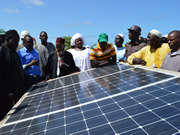
Mr Guèye surrounded by MPs for a debriefing on the benefits of installing solar panels in his field
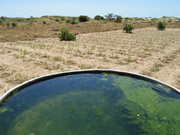
A water tank powered by solar panels and the pump. Watering these tomato plants is done manually from the water tank
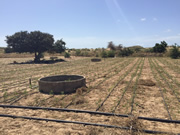
Drip irrigation system installed in the perimeter operated by Mr. Guèye
This site visit by parliamentarians was an opportunity for them to better absorb the impact of such projects on rural development, which should lead to a better understanding of rural development issues during the debates in the National Assembly. Moreover, according to the President of the Development and Town-Planning Commission, Mr. Cheikh Seck who led the delegation of parliamentarians, this experience is to be popularized.





scroll